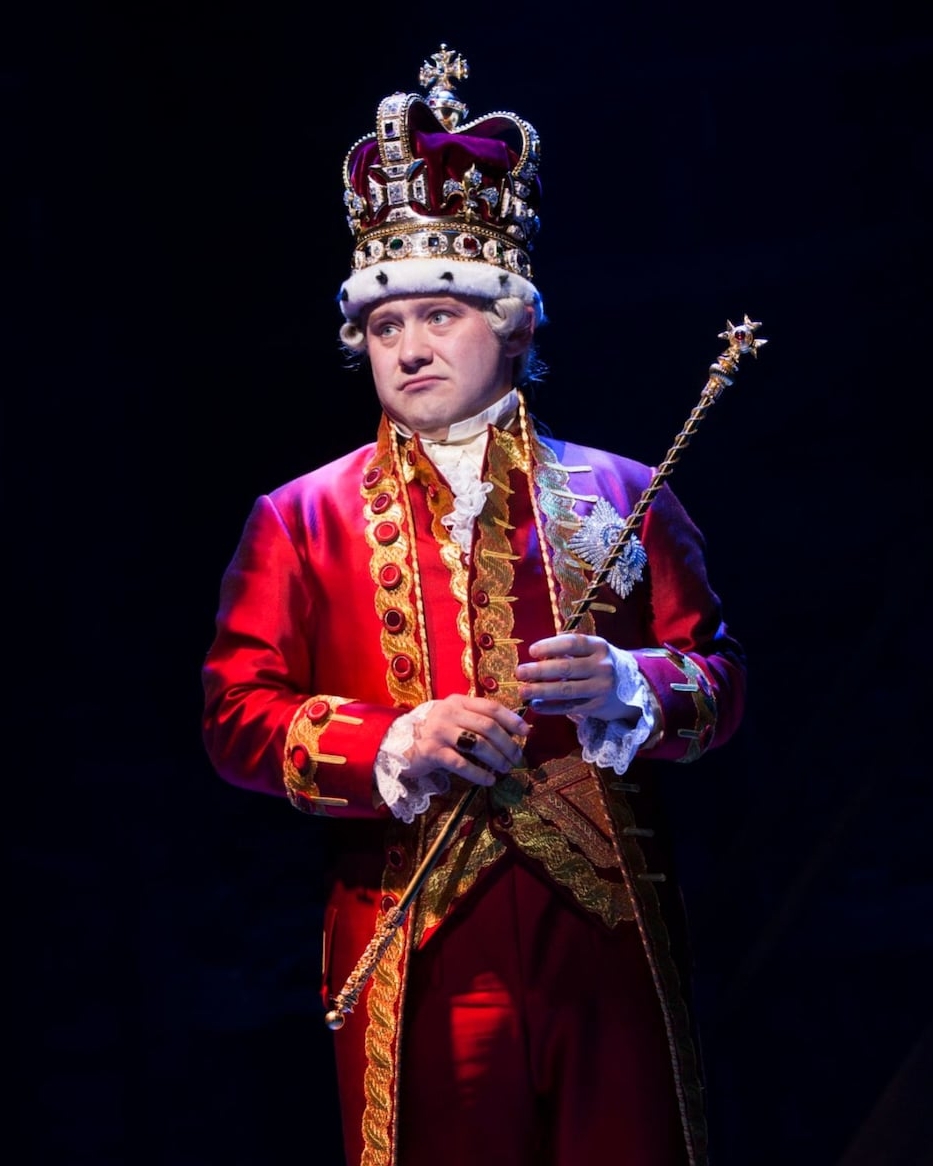THE MADNESS Michael Jibson as George III in the new London production of 'Hamilton.'
Victoria's Palace Theater
***CHECK OUT THE JAN. 9, 2018, UPDATE AT THE END: BEN BRANTLEY HAS SPOKEN.***
LONDON IS THE ULTIMATE sophisticated theater town, so we probably shouldn't be surprised that "Hamilton," which opened there on Dec. 21, is being met with the same kind of wildly enthusiastic reviews it inspired in New York two years ago. We were a little worried about one thing, however.
"You'll Be Back," sung by George III (Jonathan Groff in the original Broadway cast), is a pretty pointed parody. George, who happened to rule England at the time the American colonists started acting like rebellious teenagers, is pictured as a rather fey, ineffectual type, predicting that the colonists will change their minds and return to Mother England. "Cuz when push comes to shove," he sings, "I will kill your friends and family to remind you of my love. Da da dat da da."
Hpw have British critics reacted to that depiction? With rawther good humor, we'd say.
"George III is ridiculously funny, played by Michael Jibson as an OTT Elton John, in all his white-stocking and red-velvet glory. 'You say our love is draining and you can’t go on,' he croons to the bumptious colonialists as he cradles his golden sceptre, 'You’ll be the one complaining when I’m gone.' " ANN TRENEMAN, THE TIMES OF LONDON
"George III – played by Michael Jibson as a figure of ineffable absurdity – surveys the political infighting after Washington’s resignation with unholy relish. Crying: “Jesus Christ, this will be fun,” he jigs as if, under all the royal regalia, he were a closeted rocker." MICHAEL BILLINGTON, THE GUARDIAN
"The interludes in which our very own George III (Michael Jibson) pops up to pass sneering comment are hilarious, and come with an infernally catchy song, the lovely, Beatlesy ballad ‘You’ll Be Back.’ " TIME OUT LONDON
"One Brit, though, banishes any thought of Broadway: Michael Jibson, whose baby-faced King George is impetuousness personified. Apparently pinned in place by the weight of his crown, his body stays stock still as his face flickers through a conveyor belt of emotions. His eyes bulge mischievously, his lips pucker. He’s gooey one second, wrathful the next, then all kinds of petulant. At one point, he seems to tire of his own solo, rolling his eyes before overextending a note because, being king, well, he can. It’s the most magisterial cameo." MATT TRUEMAN, VARIETY
"Michael Jibson’s George III earns some of the biggest laughs with his foppish trolling of the American rebels." HENRY HITCHINGS, GO LONDON
"It's true that George II [sic] is very much the pantomime baddie in Hamilton.." ALICE VINCENT, THE TELEGRAPH
O.K., to be fair that last one is not from an actual review. Vincent's comment is from a feature article headlined "Who or What Is Hamilton? An Ignorant Brit's Guide to the Musical." She also quotes Simon Schama of The Financial Times as having complained last year that "anyone who knows anything about the melancholy, conscientious George III might have a hard time seeing him camp it up in the show-stopping 'You’ll be Back.' "
We'd be less likely to take Vincent's word for her own limited knowledge if she hadn't referred incorrectly (as we used to say at The New York Times) to the monarch and his number. Her article also insisted that the musical was the story of Alexander Hamilton's adventures during "the American Civil War."
UPDATE: BEN BRANTLEY WEIGHS IN!
Ben Brantley, the longtime chief theater critic of The New York Times, is an American (born in Durham, N.C.), not a Brit, but he's traveled to London (as he does from time to time) and sat among British theatergoers to check out this new production of "Hamilton." And his impressions appear to reflect the opinions expressed above.
"My audience, by the way, was especially tickled by the satirical portrait of the show's one major British character, King George III, embodied with Hogarthian* nastiness by a divinely petulant Michael Jibson."
[From the Jan. 8, 2018, print edition of The New York Times)
*Editor's Note: William Hogarth (1697-1764). London-born critic, political satirist and editorial cartoonist, perhaps best known for "A Rake's Progress." Famous for his harsh tone and more than occasional bawdiness, he was also a painter and printmaker. Today he's an adjective.

